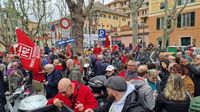In a heated exchange following an attack on a union member, the CGIL Genova and Liguria have responded robustly to Deputy Minister Rixi’s comments regarding the incident. The attack, which occurred on April 15, 2025, has sparked significant debate, particularly after the victim withdrew their complaint. The CGIL, Italy's largest trade union confederation, has called out Rixi for what they describe as his "daring" reconstructions of events, suggesting that his statements might contain valuable information for investigators.
In a recent press statement, Rixi characterized the situation as one of "instrumental hatred," implying that some individuals or groups are exploiting the incident for their own gain. The CGIL has taken issue with this characterization, arguing that it undermines the gravity of the attack and the ongoing struggles against fascism and hate in Italy. They remarked that Rixi’s assertions are not only audacious but also dismissive of historical realities, particularly the presence of fascists in Genoa, which they believe he should revisit.
The union emphasized that despite ongoing attacks on press freedom, the judiciary, and the right to protest, it is ultimately the investigators and the judiciary who will determine the facts surrounding the attack. The CGIL stated, "If the aggression occurred, we will all be very concerned; if not, we will all be very happy because the CGIL has fought against the seasons of hatred and has had its victims and faced vandalism against its offices—not in 1945, but in 2021." This statement underlines the union's historical commitment to fighting against fascism and violence.
Moreover, the CGIL highlighted the importance of peaceful, democratic, and anti-fascist gatherings, referencing recent demonstrations in Sestri and upcoming events on April 25, May 1, and June 30. They pointed out that these gatherings serve as a bulwark against bad politics and corruption, emphasizing that they have always fought to uphold the principles of democracy, freedom, and social justice as enshrined in the Italian Constitution.
The union acknowledged that their stance might not resonate with certain factions of society, particularly those who resist the antifascist narrative. They stated, "We are aware that these squares may not please that Italy which we would have liked to see pacified by sharing the values of our antifascist Constitution, born from the Resistance, as well as from the judgment of history." This reflects a broader frustration with portions of the population who, they believe, fail to recognize the importance of antifascism.
In a pointed critique, the CGIL accused Rixi of being out of touch with contemporary realities, stating that he seems unable to even utter the word "antifascist" and instead views anti-fascist demonstrations as mere theatrics meant to sow hatred. They asserted, "Genova has once again proven to be antifascist and democratic, not in the name of anyone or any episode, but in the name of the many shared values in a common history." This statement emphasizes the deep-rooted commitment of the people of Genova to uphold antifascist ideals.
Finally, the CGIL proposed a constructive way forward for Rixi, suggesting that if he truly wishes to contribute to addressing the climate of hatred and violence, he should focus on protecting workers who face daily violence, particularly those working on trains. They noted that a state of agitation has been declared in Liguria in response to this ongoing issue. The CGIL concluded with a sarcastic suggestion that Rixi might also advise his "captain"—a reference to the leadership of the government—to refrain from engaging in campaigns that incite fear and social hatred, remarking, "But perhaps this is asking too much."
This exchange highlights the ongoing tensions in Italy surrounding issues of fascism, labor rights, and the role of government officials in addressing these matters. As the CGIL continues to advocate for workers’ rights and antifascist values, the response from Deputy Minister Rixi reflects a broader political divide in the country regarding the interpretation of recent events and the historical context of fascism in Italy.





